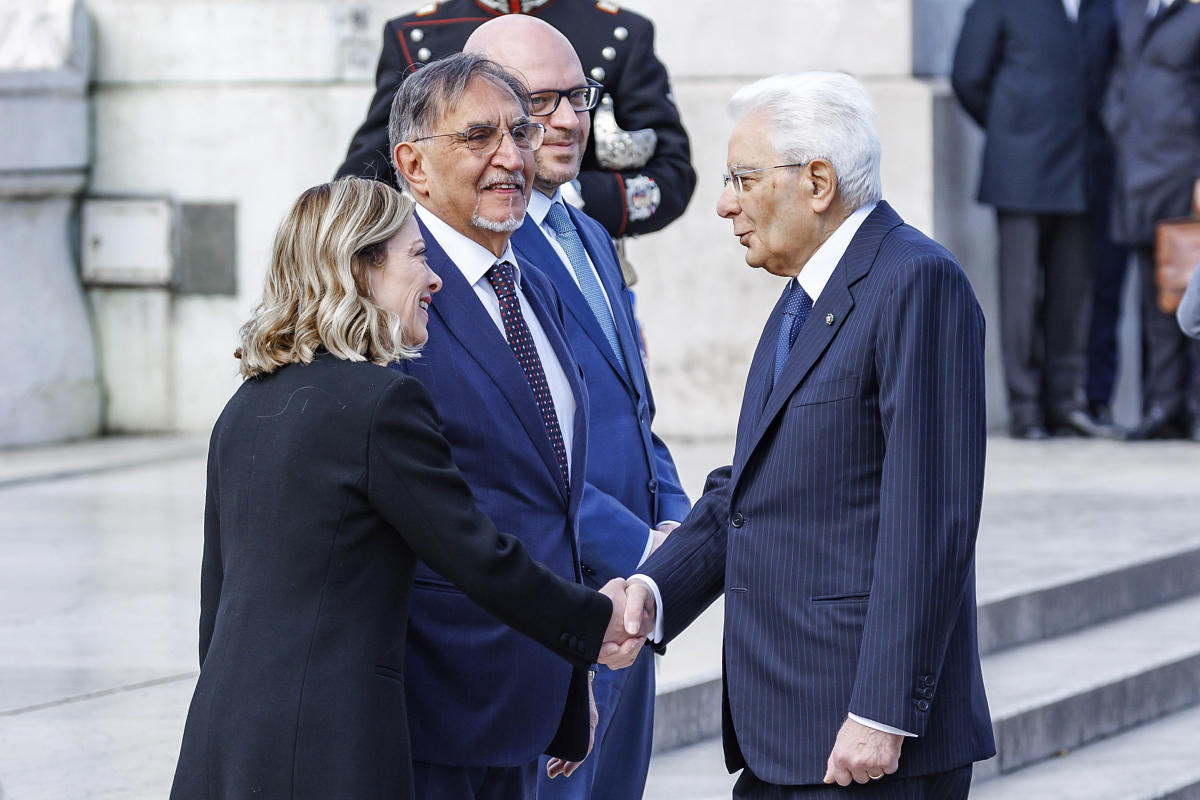ROME (AP) — Italy marked its liberation from Nazi occupation and fascist rule Thursday amid a new media controversy over suspected censorship and the legacy of Italy’s fascist complicity in the crimes of the Holocaust and World War II.
Prime Minister Giorgia Meloniwhose party, the Brothers of Italy, has its roots in the neo-fascist movement that emerged after the fall of dictator Benito Mussolini, joined the Italian president at the Tomb of the Unknown Soldier in Rome for the solemn commemoration of Liberation Day.
This year’s anniversary was marked by a media storm over the decision of state television RAI to denounce a planned Liberation Day monologue by an Italian author in which he denounced fascism, and what he said was Meloni’s refusal to reject this.
The issue has struck a chord in Italy, where Meloni’s election in 2022 as the first far-right leader since World War II has revived criticism that Italians have not fully reckoned with their fascist past in the same way as ordinary Germans did that with National Socialism.
The suggestion that RAI censored Antonio Scurati’s monologue because it criticized Meloni, her party and persistent neo-fascist sentiment dominated Italian news for days. In an attempt to put the issue to rest, Meloni self-published the Scurati essay on her Facebook page with an introduction accusing the left-wing opposition of creating a scandal where none existed.
In the post, Meloni said she did not know what happened at RAI, but noted that the state broadcaster said it simply did not want to pay Scurati “1,800 euros ($1,930; the monthly salary of many employees) for a one-minute monologue.”
The monologue, which would have been broadcast as part of the RAI’s Liberation Day commemorations, recounted well-known incidents: the June 10, 1924, assassination by Mussolini assassins of a socialist lawmaker opposed to fascism, Giacomo Matteotti, and the massacres of 1944. of Italian citizens during the Nazi occupation.
“These two simultaneous sad anniversaries – Spring of ’24, Spring of ’44 – proclaim that fascism throughout its entire historical existence – not just at the end or occasionally – was an irredeemable phenomenon of systematic murderous and carnage-fueled political violence,” Scurati writes in his essay. said. “Will the heirs of that history recognize this for once? Unfortunately, everything indicates that this will not be the case.”
Meloni has tried to distance her Brothers of Italy party from its neo-fascist roots and has gone out of her way to forge ties with Italy’s Jewish community, support a long-delayed project for a Holocaust museum and support Israel, including in the current war . in Gaza.
But the opposition has accused its forces of refusing to declare themselves firmly ‘anti-fascist’.
In an Instagram post Thursday, Meloni again avoided using the term “antifascist,” instead celebrating how Liberation Day symbolized “the end of fascism” and “laid the foundation for the return of democracy.”
“We reaffirm our aversion to all totalitarian and authoritarian regimes. Those of yesterday, which oppressed peoples in Europe and the world, and those of today, which we are determined to resist with dedication and courage,” she wrote.
RAI, for its part, has launched an internal investigation to gain insight into the decision-making that led to the criticism of the Scurati monologue. Scurati is the author of the prize-winning volume “M” about the rise of Mussolini and its parallels with the present.
Perhaps predictably, the suggestion that the state broadcaster added a Scurati text critical of Meloni’s ruling party has only drawn attention to it, with calls for mayors to use their Liberation Day speeches this year to quote from it.
“Basically there is a rule that we must not forget,” wrote commentator Aldo Grasso in Corriere della Sera. “Once a text has been censored, there is a great risk that the text itself will no longer be verifiable and will take its own unpredictable path: the ‘boomerang effect’. This is what happened.”
The RAI controversy has fueled tensions on a Liberation Day that was already high given Israel’s war in Gaza and planned pro-Palestinian marches in Italy on a day that traditionally celebrates Italy’s Jewish community. But the Italian association of partisans who fought against the Nazi occupation and fascist forces planned to continue marches, including one in Milan with Scurati.
“Long live the anti-fascist republic!” was on the Liberation Day banner of the National Association of Italian Partisans this year.





